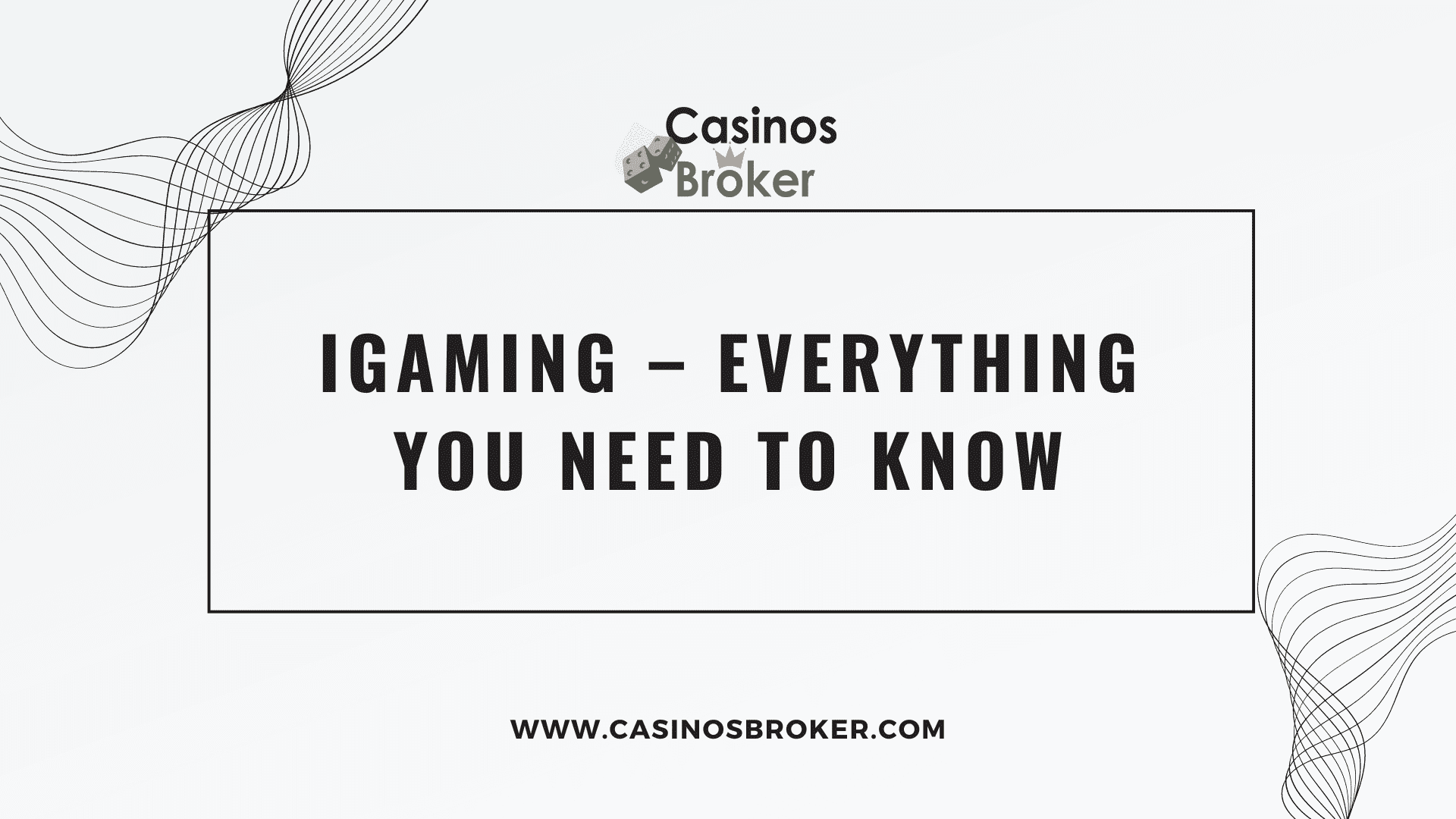With lobbyists lobbying for further global accessibility to the iGaming sector and an expected net worth of over $100 billion by 2024, iGaming is a serious business.
It can also be a significant source of income on occasion and amusement. In this post, the final point will be the most crucial for us.
Sure, go ahead and play online poker to get a rush if you’re the kind of person who enjoys online gambling. Act sensibly when doing so.
Those who wish to make money in this field are the target audience for this essay, which concentrates on the business aspect of the sector.
Not owners of casinos, but rather marketers looking to expand the reach of iGaming internationally.
In order for that to occur, advertisers must be aware of:
- What is iGaming and how does it operate?
- Why is this vertical so appealing?
- What is permissible and governed in different nations
- What the industry’s current difficulties and trends are
- How to market iGaming deals efficiently
Let’s begin by outlining our topic of discussion in detail.

What iGaming is and is not
If we had one major issue with iGaming as a whole, it would be with its name.
Online gambling or betting is another name for iGaming, or Internet gaming.
Many individuals, such as bloggers and digital marketers, mistake it for gaming and believe that putting a wager on 888.com is comparable to playing Fortnite. If Fortnite adds random loot boxes, then it will be.
But in the interim, let’s describe iGaming as an online entertainment genre in which the majority of game outcomes are determined by chance. This comprises:
- Online gaming
- Sports wagering
- Betting on horse races
- Online poker
- Mobile gaming
Without having to go to a physical casino or other venue, all of this and much more can now be accessed online with beautiful graphics and a user-friendly interface.
How did we arrive at this position?
History of iGaming
Video games have a long lineage dating as far back as the 1950s. Online gambling, however, hasn’t been around that long but it still has made its presence earlier than you would assume.
The discussion about the history of online gambling often mixes online and offline activities. Offline, standard gambling is a whole separate topic that we won’t go into right now. It’s enough to say that the offline world has paved the world for online activities.
The first iGaming site has been around since 1994 and it was started by Microgaming. The same year Antigua and Barbados passed an act that allowed companies to run online casinos around the world.
What followed is a series of small progressions, both in the legal framework and business opportunities. The year 1998 witnessed the launch of the first online jackpot. In 2003, today’s iGaming behemoth, 888.com (8 is a symbol of hope in Chinese culture) was born.
Since then, the iGaming world has seen a gradual development of iGaming platforms paired with the back-and-forth introduction of various legislations.

Technical advancements
The emergence of the iGaming sector would not have been possible in the absence of numerous significant technological innovations. Those early innovations were primarily concerned with enhancing online transaction security.
It is interesting to note that there was no common standard for safe communication when Microgaming created its platform. When SSL was first released in 1995, the industry was able to expand quickly.
The increasing significance of mobile devices is the second chapter in the history of iGaming. From the late 2000s to the early 2010s, individuals began to consume information on mobile devices. Gambling is included in this.
Right now, you are nonexistent if you don’t have a mobile presence. Clearly.
Rise of hubs
In favorable environments, the necessary modifications to the legal system flourished the most. These locations (countries or territories) typically have a long history of drawing in companies that would struggle to function in “regular” countries.
The bulk of iGaming platforms run out of these hubs, which are:
- Malta, Gibraltar, UK
With one conspicuous exception, these hubs are where the iGaming platforms have expanded to offer services in numerous nations.
iGaming in the United States
Saying that the history of iGaming in the US is convoluted would be an understatement. A detailed examination of the numerous measures that either aided or hindered the iGaming industry’s progress is well outside the purview of this piece. Additionally, it would be useless for marketers who just want to start a campaign with an iGaming theme.
It is crucial to note that the US legal system is complicated enough without different interests and parties battling one another over incompatible rules. Important laws pertaining to iGaming are enforced at the federal level (such as the long-standing prohibition on funding such services), while other laws are governed at the state level. A few of these laws are even a part of a larger framework that oversees Native American affairs (since they are permitted to operate conventional brick-and-mortar casinos).
An overview of this topic is as follows: in the US, iGaming platforms had to be developed in tandem with their traditional counterparts, whereas in Europe and other parts of the world, online gambling sites could enter the market and start advertising their services with supporting legislation. Both a hotel and a casino can introduce their iGaming platforms and leverage their guest lists, marketing campaigns, and other assets to entice patrons to keep playing even when they are off the property.
As of 2024, the US has not yet been overtaken by rising and merging domestic corporations or penetrated by major international ones.
The conclusion for online advertisers
Whether you promote a third-party offer or your own, you are still in charge of ensuring that what you promote is:
From the publisher’s point of view, allowed and lawful in the GEO you advertise in
The legal landscape is constantly shifting, so being current with the most recent developments is crucial. There is now no single federal statute that governs iGaming advertising generally, therefore if you promote in the US, check the state regulations for online gambling instead of looking for federal rules.
Trends and challenges of the iGaming industry

Online gaming is doing well commercially, and the outlook is even more promising, as this industry’s projected net worth for the future demonstrates.
However, in order to secure further expansion, the industry needs to address a few issues. Let’s examine each one in turn.
Legislation
To return to this subject for a second, it will be necessary to determine the legality of online gambling, particularly in the larger markets. The industry is too large to be categorized as disposable clothing.
Many iGaming enterprises that make taxable revenue are slowed down by their murky status. The largest obstacle that iGaming must overcome is more pressure on various government agencies.
Popularity among young generations
The gambling industry as a whole was preoccupied with Millennials a few years ago. They are now concentrating on Gen-Z, or those born after 1995.
The legal gambling age has been achieved by this generation. Because of their youth, kids may have the longest lifespan value, but they also exhibit distinct behavioral patterns, thus new approaches and messaging are required to address them.
Being the first generation to grow up entirely online, they are resistant to the majority of common ploys and catchphrases. They now know better than to believe everything they read or see online.
They belong to a generation that also has less disposable income. Finally, their choices appear to be less hazardous.
This does not imply that the iGaming sector has lost this generation. It simply implies that in order to meet the demands of the entrants, the industry must reinvent itself. The corporations risk going downhill into more specialized and forgotten entertainment if they don’t succeed in doing this.
What then ought to be highlighted when discussing online gambling with Generation Z?
- The social component. Gambling is an emotional game, but it doesn’t always have to be about an adrenaline rush; it may also be about enjoying the company of other players.
- Repute of the company. Gen Zers are aware of the ethical implications of conducting business. You could wish to share with them your CSR endeavors or your responsible gaming philosophy.
- Images. The younger generation is accustomed to playing video games and is aware of what they could look like. Make sure you take advantage of the most recent technological advancements.
- First on mobile. The majority of content on cellphones is consumed by people in their twenties. A desktop PC is as foreign to them as a record player. Ensure that your mobile website or app is optimized for smaller screens.
Market saturation
In addition to new players, the growing popularity of online gambling also draws new businesses looking to take advantage of the opportunity. The number of people using the Internet worldwide is increasing, but it is still insufficient to offset the recent surge in new iGaming platforms.
For marketers, this might be good news because it means higher marketing spending due to increasing competition. Marketers can still make money if they have the courage to think creatively and unconventionally in order to get their message in front of as many people as possible.
What the Future Holds For iGaming
Many developments are gradually altering the way the iGaming sector functions. These tendencies center on implementing new technology to increase gaming’s speed, safety, and appeal to a wider range of players.
Let’s look into these.
Blockchain
iGaming, like a lot of other businesses, is currently enthralled by blockchain technology. Although this is frequently just a catchphrase used to draw in investors, there is a compelling case to be made for blockchain technology to be implemented by the online gambling sector.
Blockchain is a globally trusted distributed database. As the only keeper of a transaction record, an online casino holds a disproportionate amount of control in a traditional arrangement. Blockchain technology creates a shared, unchangeable ledger that empowers all network users and fosters trust.
Cryptocurrency
It’s quite unlikely that anyone on the planet hasn’t heard about cryptocurrency. From the standpoint of the recipient of payment, cryptocurrencies have some benefits and drawbacks.
Positively
- Quick payments
- Not governed by the government
The drawback consists of:
- Variable exchange rates
Using cryptocurrency for payments may attract more users who are worried about government investigations into their spending. In addition, payments will be made more quickly and without incurring extra bank fees.
Virtual reality
The ideal option for transferring the gaming experience from land-based casinos into your house is virtual reality.
Younger consumers respond to this technology the most since they frequently think it’s more approachable than going to a hotel with a casino.
How to effectively promote iGaming offers
One of the most often used niches for push notifications is iGaming. One of the primary venues for selling push traffic for iGaming offers is Pushground.
When developing iGaming campaigns, bear the following considerations in mind.
Keep as much track as you can
Because push advertisements don’t offer necessary user data, it’s critical to gather this data yourself. To accomplish this, you can:
- Utilizing Pushground’s tracking tokens, or macros, to transfer as much data as you can from a campaign URL to your affiliate network or tracker.
- Using postback or pixels to track conversions.
Recall that having more data will help you learn more about your visitors and enable you to make more precise selections. For the best possible campaign optimization, conversion tracking is necessary.
Utilize retargeting techniques
A savvy strategy involves targeting specific audiences who have previously engaged with your landing page. These individuals are more inclined to take the final action, having already displayed interest.
The system automatically gathers visitors into distinct audiences. Subsequently, you gain the ability to craft new campaigns, tailoring them to different audiences by either excluding or including them, all customized to suit your needs.
Gather user data
Securing information from your site’s visitors is essential for future outreach. One effective method is to incorporate a form on your landing page to capture visitors’ email addresses.
While the primary aim of such a form is lead generation, it’s not without its complexities. Visitors may hesitate to divulge personal details, particularly online. The length of your form directly impacts lead generation; shorter forms tend to yield more leads.
Thus, it’s crucial to prioritize the information you wish to collect. In digital advertising, the essentials usually include the visitor’s name and email address.
Pro Tip: Enhance the visibility of your form by employing vibrant colors to attract visitors’ attention. Position the form above the fold to ensure it’s immediately visible without scrolling.
The color of your call-to-action (CTA) button should starkly contrast with the background and overall design of the landing page. This contrast is vital for prompting users to complete the form and click on the CTA button. Ensure your message is concise and clear: ‘claim your prize’, ‘play online’.
Payout Models
As you may already be aware, promoting affiliate offerings earns you rewards in the affiliate marketing business. However, the amount of money you make will rely on your payment model.
There are several payout types available; the following are the ones we suggest for iGaming offers:
- Each Action’s Cost (CPA). This is among the most often used payment options in this sector, enabling you to get paid every time a user completes an affiliate network-specified task. Refraining from clickbaiting tactics is crucial to retaining high-quality leads.
- Share of Revenue (RevShare). Affiliate networks frequently employ this strategy, which is particularly well-liked for iGaming offers. A certain portion of the site’s overall earnings from the clients you referred will be given to you.
Use captivating titles & creatives
Since iGaming appeals to our more sentimental and less logical sides, your message should be effectively conveyed through powerful visuals!

Crafting Compelling Titles and Descriptions
When it comes to writing captivating titles and descriptions, consider these effective tips:
Call to Actions: Always kick off your CTA with a commanding verb like “get,” “win,” or “take.”
Examples:
- Bet Now
- Spin The Wheel
- Get Your Bonus
- Join Now
- Win The Jackpot
Utilize Exact Numbers: Instill trust among visitors by providing precise figures, such as a specific number of spins or a set bonus amount.
Be Direct: Ensure your message is straightforward and easily understood by the user. For instance, “Spin the wheel to win a prize,” “Multiply your wins,” or “Test your luck.”
Creatives
For more credibility, it is imperative that the photos you use for your creatives complement the style of the landing page.
You can always take screenshots of the landing page or look for pictures online; there are many possibilities available, like slot machines and spinning wheels, among other things that might draw in visitors.
There are a ton of free stock images available. One excellent place to find royalty-free photographs is Pexels.com.
A lot of affiliate networks offer creatives or entire landing pages as marketing collateral.
A new vertical at your fingertips
You now possess sufficient knowledge to begin your own advertising. Experience the thrill of venturing into a new vertical or returning to a familiar one with enhanced knowledge and strategies.
Among the few verticals with the most growth potential is iGaming. The largest leap is yet ahead of us, as more and more advantageous laws are being established in the US (for instance, it is now permitted to place an online wager in New York as of January 2022).
Frequently Asked Questions (FAQ) about the iGaming Industry
Is the iGaming market really worth $100 billion?
actually, it has already surpassed that. While earlier forecasts predicted the $100 billion milestone, recent 2024 data values the global online gaming market at approximately $208 billion, with projections hitting $225 billion by 2025. The industry is compounding at a rate (CAGR) of roughly 9-11% annually. For marketers, this means the “pie” isn’t just big; it is expanding faster than almost any other entertainment vertical.
How does Gen Z’s gambling behavior differ from Millennials?
Gen Z (ages ~18-27) treats gambling as a social activity rather than a solitary pursuit. Recent data indicates that 53% of Gen Z bettors prefer betting with friends or in social environments, compared to only 34% of Millennials. Furthermore, while Gen Z participation in land-based casinos is dropping (-6%), their engagement in online sports betting grew by 7% in 2025. If you are marketing to this demographic, focus on “social proof,” influencer campaigns, and mobile-first experiences.
What is the legal difference between “iGaming” and “Esports Betting”?
This is a common confusion. iGaming refers to games of chance (RNG-based) like slots, roulette, or online poker where the “house” has an edge. Esports Betting is the act of wagering on competitive video gaming (skill-based) tournaments like League of Legends or CS:GO. While they are different products, they often overlap in an operator’s sportsbook. Esports betting is currently one of the fastest-growing entry points for younger audiences into the wider iGaming ecosystem.
Why are operators pushing for Cryptocurrency and Blockchain adoption?
Beyond the “hype,” crypto solves two massive operational headaches for operators: speed and chargebacks.
-
Speed: Crypto settlements are near-instant, whereas traditional bank wires can take 3-5 days.
-
Security: Blockchain transactions are irreversible. In the traditional fiat world, “friendly fraud” (where a player loses money and calls their bank to cancel the transaction) costs the industry billions. Blockchain eliminates this risk entirely, which is why many operators offer higher bonuses for crypto deposits.
Can I run iGaming ads across the entire United States?
No. The US is not a single market; it is a fragmented landscape of over 50 distinct jurisdictions. While federal laws like the UIGEA (2006) restrict payment processing for illegal sites, the legality of operating and advertising is determined at the state level. As of 2025, over 38 states have legalized sports betting, but fewer than 10 states (including NJ, PA, MI) have fully legalized online casinos (slots/table games). You must geo-target your campaigns strictly to legal states to avoid regulatory penalties.





